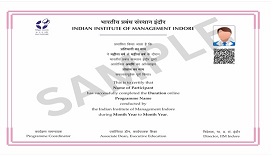
Certificate Programme in Corporate and Public Leadership in a VUCA World, Batch 03
Associate for Technical and Student Support: Jaro Education
Programme Overview
The 21st century is increasingly recognized as the age of disruption. Global business is being reshaped by wars, trade conflicts, resurgent nationalism, technological rivalries, climate shocks, and regulatory upheavals. Long-standing assumptions about globalisation, supply chain stability, and market predictability are being challenged at an unprecedented pace. In this environment, non-market forces, including geopolitical shifts, social movements, regulatory change, and public sentiment, play a decisive role in determining business outcomes.
Navigating such volatility requires resilient leadership. Corporate leaders today must operate in a BANI (brittle, anxious, non-linear, incomprehensible) world, managing uncertainty, interpreting complex risks, and making informed decisions under pressure. Effective leadership now extends beyond organizational boundaries: it involves engaging diverse stakeholders, fostering agility in systems, and embedding resilience as a core capability. Building reliability and trust across markets, governments, and societies is essential to sustain long-term performance.
This executive education programme, delivered through 70 online sessions of 75 minutes each, equips corporate leaders, policymakers, and entrepreneurs with the frameworks, foresight, and multidisciplinary insights needed to lead effectively in disruptive times. Participants gain in-depth knowledge across geopolitics, public policy, ethics, CSR, technology, and industrial strategy, enabling them to anticipate risks, shape strategy, and drive organizational resilience in a constantly evolving global landscape.
Objectives:
- Earn Executive Education Alumni status – IIM Indore
- Learn modern corporate & public leadership practices
- Live sessions with experienced IIM Indore faculty
- Flexible online classes on weekends or after work
- Case study-driven, real-world learning
- 3-day immersive on-campus experience
Learning Outcomes
Participants will gain the following benefits:
- Understand global shifts and anticipate opportunities and risks.
- Engage with governments and regulators to navigate policy changes.
- Embed ethics, sustainability, and social responsibility into business strategy.
- Leverage disruptive technologies in AI, digital governance, and innovation.
- Draw insights from India’s policy and industrial trajectory.
- Build resilience strategies through scenario planning, case studies, and simulations.
Pedagogical Methodology
- Panel Discussions
- Interactive Lectures
- Case Studies
- Continuous Evaluation
Who Should Enrol?
- Corporate leaders aiming to strengthen foresight, resilience, and stakeholder management
- Policymakers and strategists seeking to anticipate business responses and enhance governance
- Entrepreneurs and innovators are designing resilient strategies for global competition
- Mid to senior-level managers preparing for leadership roles at the business–policy–ethics nexus
- Professionals focused on emerging markets and Global South opportunities
Programme Content
Module 1: Geopolitics & Strategic Complexity / Geopolitics and Growth: Resilient Leadership Beyond Borders
- The fractured global order: from liberal globalisation to multipolarity
- Geopolitical risks as business risks: contagion and systemic disruption
- Trade wars, tariff regimes, and shifting supply corridors
- Great-power rivalry (U.S.–China–EU) and its impact on corporate strategy
- The rise of the Global South: BRICS+, ASEAN, and new alignments
- Case study: Semiconductor wars and the “small yards, high fences” doctrine
- Scenario workshop: Navigating geopolitical flashpoints
Module 2: Business, Government, and Society / Beyond the Firm: Leadership at the Business–Policy–Society Nexus
Focus: power, influence, policy, regulation, lobbying, PPPs
- The firm in the age of regulatory activism
- Stakeholder capitalism: beyond shareholder value
- Business–government relations: lobbying, negotiation, and influence
- Society as a stakeholder: civil society, NGOs, and grassroots movements
- State-owned enterprises and public accountability
- Case study: ESG pressures in extractive industries
- Simulation: Negotiating a business–government compact
- Panel discussion: Voices from industry, government, and civil society
Module 3: Ethics, CSR, and Responsible Leadership
Focus: ethical decision-making, organisational wrongdoing, legitimacy, managerial dilemmas, ESG frameworks
- Ethical dilemmas in times of crisis
- CSR and ESG frameworks in a multipolar world
- Corporate governance and global accountability
- Sustainability transitions: balancing growth and climate responsibility
- Cultural contexts of ethics: India, China, Europe, and the U.S.
- Case study: The Volkswagen emissions scandal and lessons for trust
- Workshop: Building an ethical decision-making toolkit
Module 4: Public Policy and Regulatory Landscapes / Future-Proof Leadership: Strategy for a Digital and Disrupted World
- Policy as a driver of corporate opportunity and risk
- Global trade governance (WTO, regional trade blocs, plurilateral agreements)
- Competition law, antitrust, and digital markets
- Environmental and labour regulations across jurisdictions
- Case study: India’s digital public infrastructure (UPI, Aadhaar, ONDC)
- Policy roundtable: The challenges of regulatory harmonisation
Module 5: Industrial Policy in an Age of Disruption
- The return of industrial policy in the U.S., EU, China, and India
- Green industrial policy: energy transition, EVs, and decarbonisation
- Strategic sectors: semiconductors, AI, biotech, and clean energy
- Industrial subsidies, WTO tensions, and global supply chains
- Case study: The Inflation Reduction Act and global ripple effects
- PPP and its role in industrial policy
Module 6: The AI Challenge / Innovation and Integrity: Leading in the Age of AI and Accountability
- AI as a general-purpose technology: opportunities and disruptions
- Risks: bias, misinformation, labour displacement, and security
- Ethics of AI and algorithmic accountability
- AI in corporate strategy: applications across sectors
- AI and geopolitics: national AI strategies and digital sovereignty
- Case study: Generative AI in finance, healthcare, and manufacturing
- Simulation: Boardroom debate on AI adoption risks and rewards
- Workshop: Building an AI governance framework
Module 7: India and the Global South: Policy Futures / India and the World: Leadership for the Global South and Beyond
- India’s economic trajectory and its leadership aspirations
- Industrial policy, Make in India, and digital transformation
- India’s regulatory innovations in fintech, health tech, and climate policy
- The Global South perspective: South–South cooperation and multipolarity
- Case study: India’s renewable energy mission and global leadership
- Designing India’s policy strategy for 2030
Note: Courses and modules are indicative and subject to change.

Eligibility Criteria
- Applicants should be working professionals or entrepreneurs.
- Diploma (10+2+3), graduates (10+2+3 or equivalent), or postgraduates in any discipline recognised by UGC/AICTE, with a minimum of 50% aggregate marks at either the UG or PG level.
- A minimum of three years of work experience after completion of the qualifying education is required.

Pedagogy
- The OLP will be a mix of lectures, case studies, panel discussions, and guest lectures by subject experts.

Certification
Successful Completion Certificate by IIM Indore in a valedictory ceremony to be held on the campus.
* Sample certificate is indicative. The Institute reserves the right to revise it.
**The Completion certificate will only be awarded to participants who complete the
programme evaluation and attendance criteria.

Attendance Criteria
Participants are expected to attend all sessions of a given course. However, they may take leave in case of emergencies, subject to the approval of the Programme Coordinator. A minimum of 75% attendance is required for final grading; participants with less than 75% attendance will be subject to grade reduction as per Institute norms.

Evaluation Criteria
- Participant performance will be monitored continuously through quizzes, assignments, tests, and examinations. Participants are required to achieve the minimum marks or grades as determined by the Institute from time to time to successfully complete the course.
How the Courses will be Delivered:
Courses will be delivered through online mode using an appropriate technology-synchronized platform. Lectures will be delivered through broadband-based technology involving two-way audio and video communication. Sessions will be held once a week, generally on weekends. Participants can attend sessions directly from their desktop/laptop (Direct-to-Device). Participants will be provided with reading materials, etc., for each course. They may also interact with the concerned faculty through e-mails/chat mode.
*The programme duration may be slightly extended due to issues like faculty unavailability and gazetted holidays on the session days.
- Technical Orientation Date: 11th April 2026
- Academic Orientation Date: 12th April 2026
- Programme Commencement Date: 19th April 2026
The academic sessions will start from April 2026. Sessions will be held every Sunday.
The timing of the sessions: Sunday, 75 minutes each session.
- First Session: 10:30 AM to 11:45 AM (IST)
- Second Session: 12:00 PM to 01:15 PM (IST)
The time gap between two consecutive sessions is to give the participants a break. On some days, the classes may extend beyond the mentioned time. In addition to attending interactive sessions, participants have to undertake online quizzes, assignments, and examinations.
Total Fees and Payment Schedule
Fee Structure
| Application Fee | INR 2,500/- |
| Total Programme Fee | INR 1,75,000/- + GST* |
Instalment Pattern
| 1st Instalment | 2nd Instalment |
| INR 90,000/- + GST* (April 08, 2026) |
INR 82,500/- + GST* (June 10, 2026) |
*GST (Currently 18%) will be charged extra on these components.
Student Privileges
The participants who will complete the programme successfully will be eligible for the Executive Education Alumni status of IIM Indore. They will be required to apply separately for this, along with the necessary fee to register their name. Current alumni membership plans are as follows:
- 2-year membership – INR 1000/- + applicable taxes
- Lifetime membership – INR 10,000/- + applicable taxes
Benefits available to Executive Education Alumni:
1) Have access to brochures and newsletters from IIM Indore.
2) Access to the IIM Indore Campus Library (onsite access only).
3) Official email ID of the institute.
Mere successful completion of the programme, application submission, and payment of the fee does not entitle a participant to be eligible for executive education alumni status. IIM Indore reserves the right to confer executive education alumni status.
IIM Indore reserves the right to modify the above conditions at its discretion at any time without notice. Only the courts at Indore will have the territorial jurisdiction to try any disputes arising in respect of the Executive Alumni membership being granted.
For more details: Executive Alumni – IIM Indore
Please note that all the dates are subject to change as per the institute’s discretion.
For more details, contact: olpoffice@iimidr.ac.in
Tel.: 0731-2439739/733
Please note that IIM Indore reserves the right to change the programme design, format, number of sessions, certificate format, terms in the programme or can incorporate any such change deemed necessary by the institute without prior intimation.

